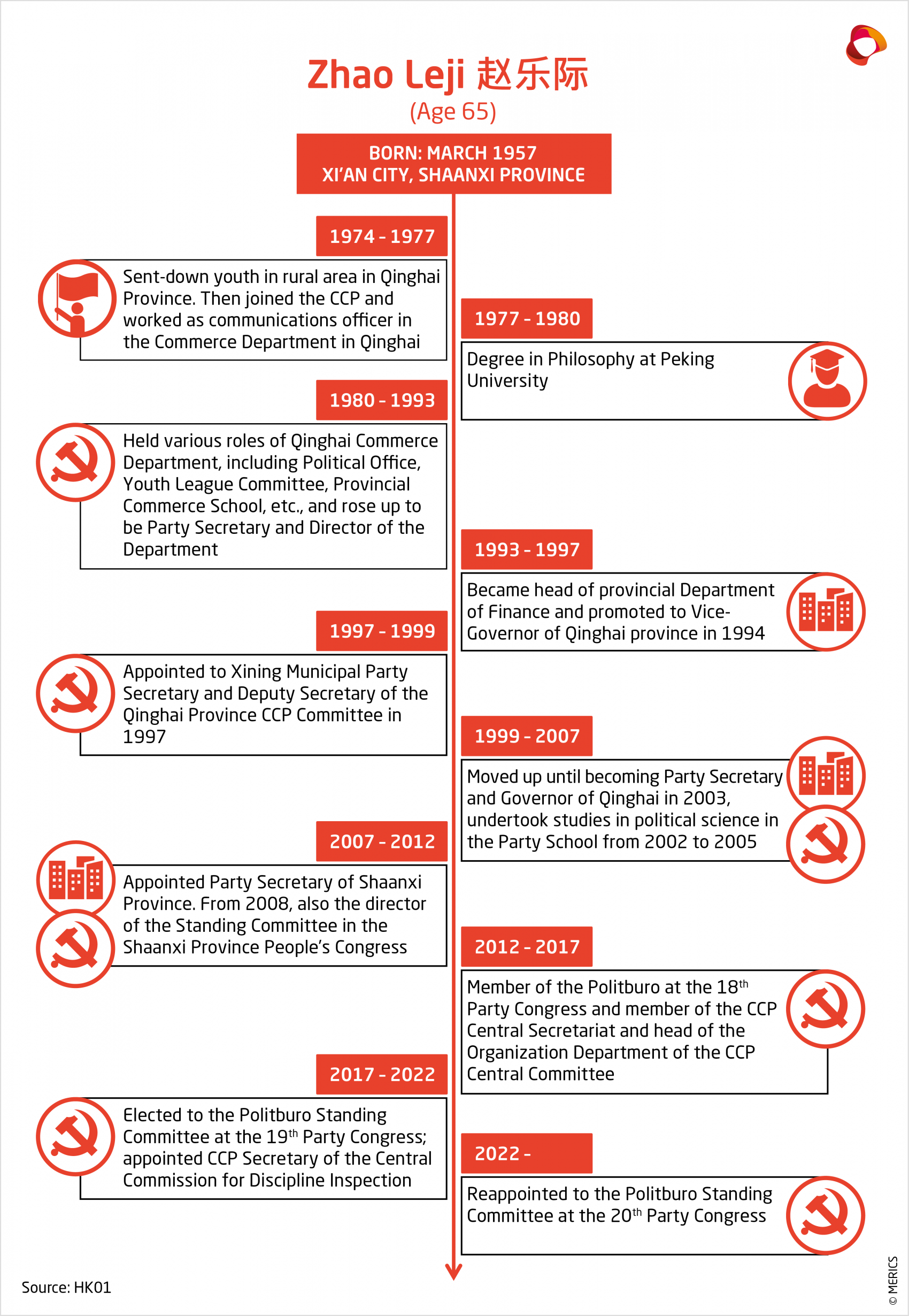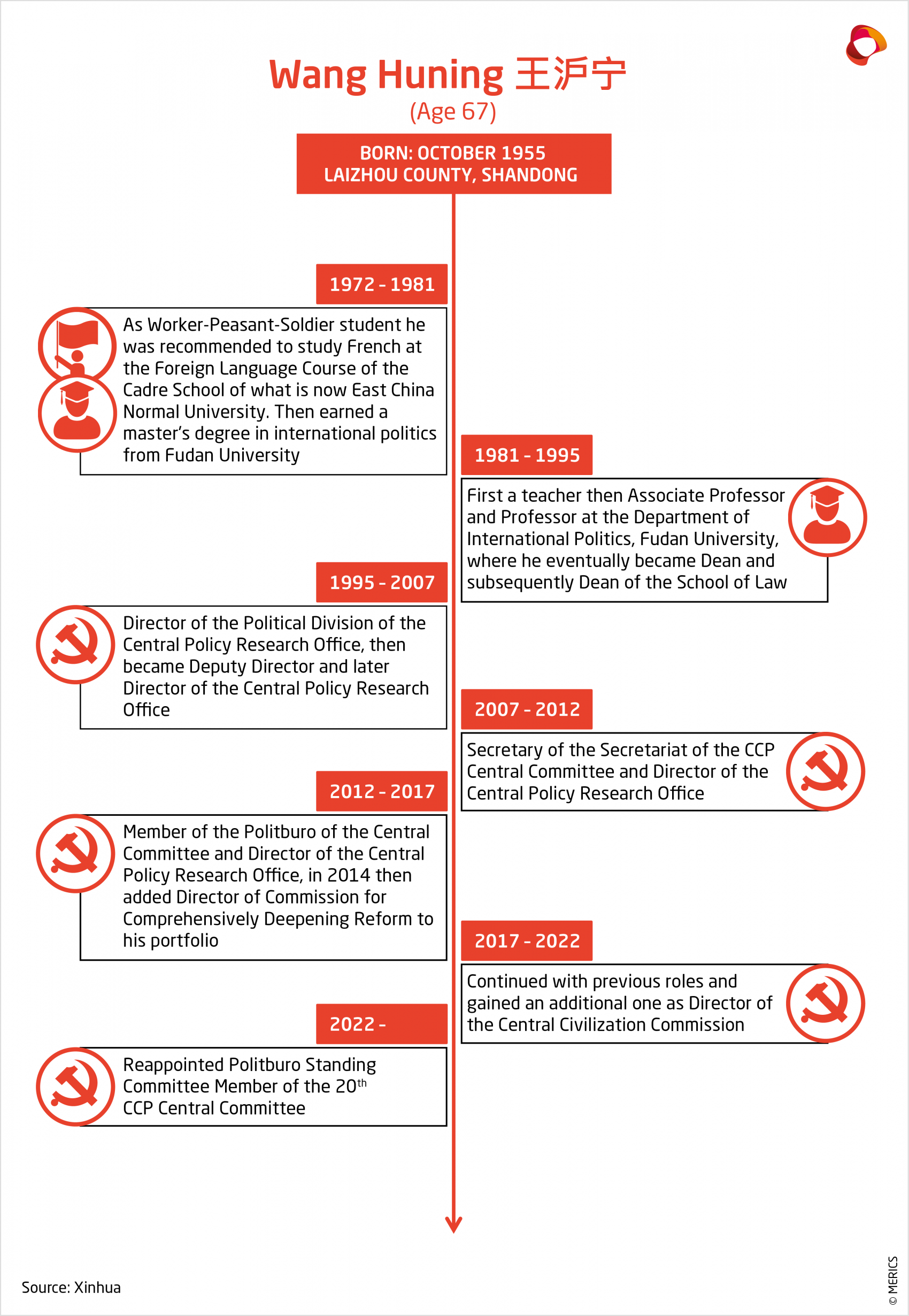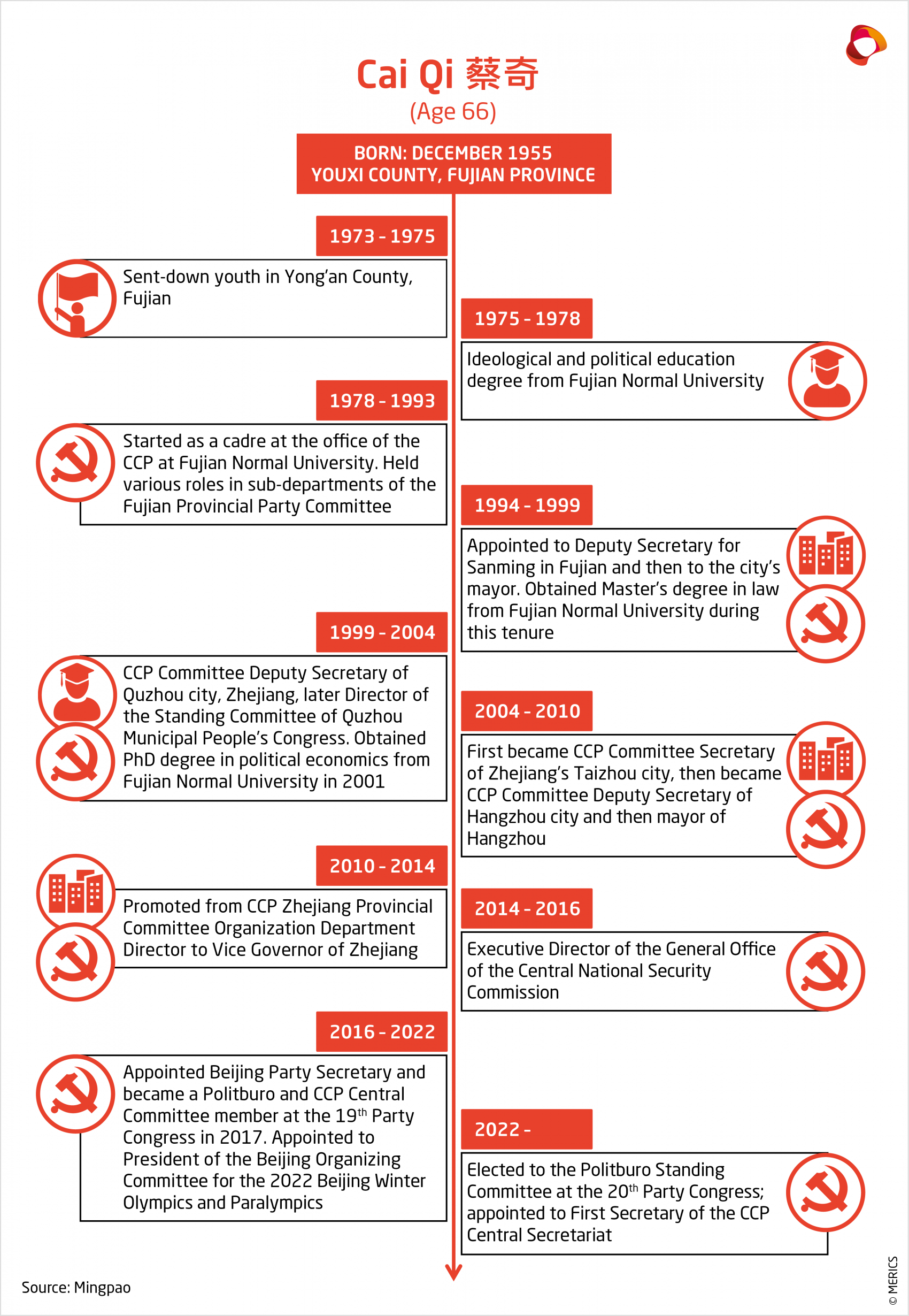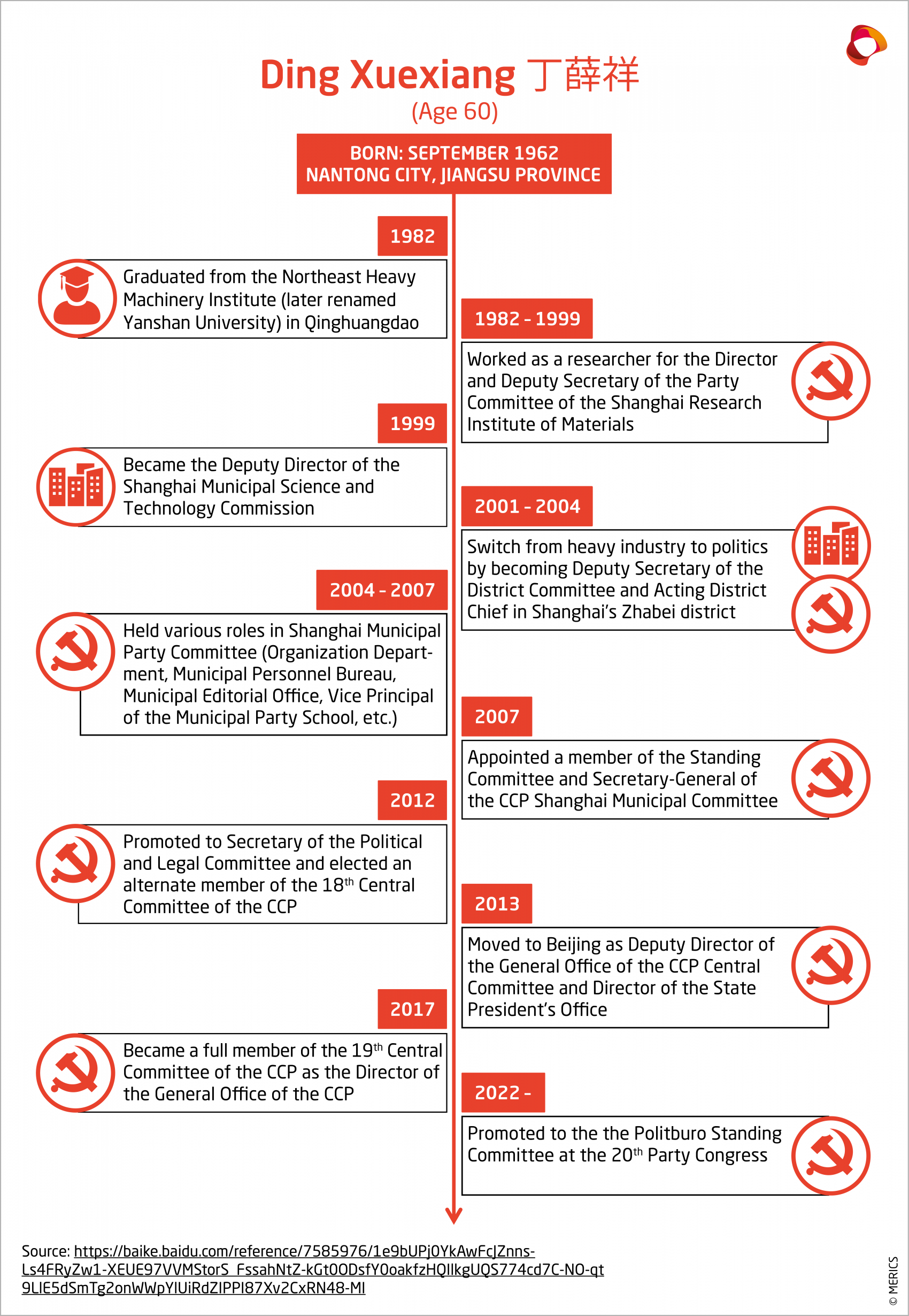
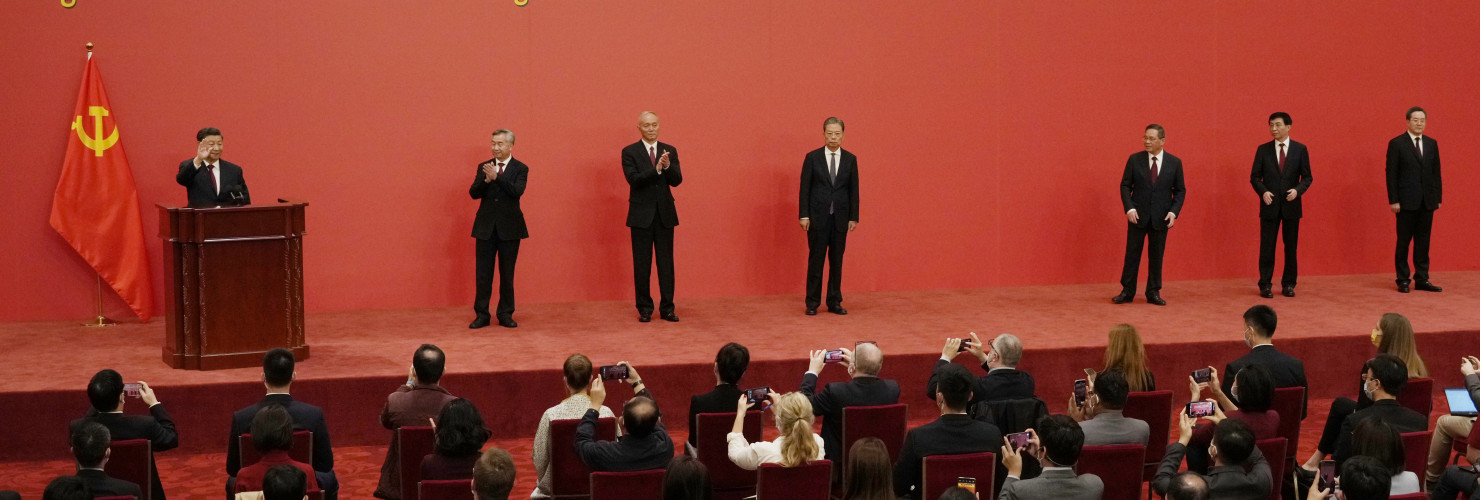
Meet China's new Politburo Standing Committee
We have profiled the new Politburo Standing Committee elected at the CCP's 20th Party Congress in October. Xi Jinping has picked six loyal officals he can rely on to support his politcal program for the next five years.
Li Qiang – Covid did not halter his standing
The political career of Li Qiang, Shanghai’s Party Secretary until recently, has reached a new peak despite struggles to control the latest wave of Covid outbreaks in Shanghai. As one of Xi's most trusted allies, his disastrous Covid management that sent Shanghai's 25 million residents into a two month-long lockdown earlier this year, has not impacted Li Qiang’s rise into the Politburo Standing Committee. He will now take over the post as premier. He is seen as business friendly hands-on manager, but he will have to work much closer towards central party objectives, i.e. Xi Jinping’s priorities, now he sits in the PBSC.
Li, a Zhejiang native, served as Xi Jinping’s chief of staff from 2004 to 2007, when Xi served as party chief of the province. He was also by Xi’s side at the latter’s first state visit to the United States in 2015. After starting as a worker, first in drainage and irrigation then at a tools factory, Li joined the Chinese Communist Party in 1983 and worked his way up in the Civil Affairs Department of the Zhejiang government before taking on party leadership roles in the province. The Shanghai Party Secretary post, which Li was promoted to in 2017, has always been regarded as a stepping stone to ascend to the highest leadership positions in the party. All but one of Shanghai’s party secretaries in the last 25 years, were promoted to the Politburo Standing Committee, the highest locus of power in China.
Media coverage and sources:
- Nikkei: Shanghai lockdown impacts Xi’s plans to promote allies
- CCP website: Biography of Li Qiang
Zhao Leji – Taking lead over China’s legislature
While Zhao Leji is usually not counted as part of Xi Jinping’s close network, he is viewed as a Xi-supporter. Zhao took over from Wang Qishan as the anti-corruption chief after the 19th Party Congress in the party’s Central Commission for Discipline Inspection (CCDI). There, he has implemented Xi’s anti-corruption campaigns against former justice minister Fu Zhenghua, and other big names including Xiao Yaqing, Sheng Guangzu, Sun Lijun. Zhao also reshaped the CCDI into the large and powerful system it is today, having investigated well over four million officials and focusing not only on corruption, but also on cadres’ discipline and ethical conduct.
Like his counterparts in the Politburo Standing Committee, Zhao started out as a “sent-down” youth in rural Qinghai at the tail-end of the Cultural Revolution. After receiving his bachelor’s degree from China’s prestigious Peking University, Zhao cut his teeth in the impoverished western provinces; first in Qinghai and later on in Shaanxi where he was the provincial Party Secretary. These stints earned Zhao a call-up to Beijing.
Zhao will take over the Chairmanship of the National People’s Congress Standing Committee, largely overseeing the state’s legislative work. He will be an important figure to push ahead Xi’s “rule-by-law” or law-based governance drive, revising and updating China’s legal body, and making sure it all aligns with party leadership standards.
Wang Huning – The party’s political theorist
Last year we said that “anything but another top job would be a surprise” for Wang Huning, and indeed, after the 20th Party Congress Wang has retained his position in the Politburo Standing Committee, China’s top decision-making body. The Chinese Communist Party’s (CCP) chief ideologue, held to be the brains behind Xi Jinping’s autocratic and ideological policy turn, was in 2017 promoted to the Politburo Standing Committee for the first time. Wang served two leaders before Xi: Jiang Zemin tapped Wang to the CCP’s top policy research center and under Hu Jintao he became its leader. Described as a bookish philosopher, Wang stands out for being the only Standing Committee member with no practical experience of running a city or province as a mayor or party secretary.
The former Fudan University professor’s influence on Xi and the CCP has nonetheless been remarkable. As head of two important party groups – the Leading Small Groups on Party-building and Ideology – and a regular entourage member on Xi’s tours, Wang is credited with developing several key ideologies such as the “China Dream” and “Xi Jinping Thought on Socialism with Chinese Characteristics”. As lieutenant to Xi in drafting the CCP’s recent Resolution on History, which gave Xi the key role in rejuvenating the nation, Wang emphasized traditional values and culture as pivotal to China’s political and social development.
From as early as the 1990s, Wang has argued in his writings that America’s liberal capitalist system is flawed and that a neo-authoritarian model with strong party leadership is superior.
So critical is Wang’s role in shaping political thought in the CCP and throughout China that it was imperative for Xi to keep his theoretician close by his side for the next five years. Wang is slated to take over Chairmanship over China’s consultative organ, the Chinese People’s Political Consultative Conference, a body where relevant non-CCP organizations, from minorities to private entrepreneurs, are meant to voice their opinion – under the leadership of the party, of course.
Cai Qi – Beijing’s former boss taking over propaganda and central party affairs
Of the newly appointed Standing Committee members, Cai is viewed as the “dark horse” and has attracted the most attention. He has served as the secretary to former Fujian party secretary Chen Guangyi and has worked in the same provinces as Xi Jinping once did – in Fujian and Zhejiang. After the 18th Party Congress in 2012, Cai was promoted from his post as Vice-Governor of Zhejiang province to become the Deputy Director of the Central National Security Commission in the CCP Central Committee in Beijing.
Since 2016, Cai was appointed both mayor and Party Secretary of Beijing. During this time, he directed several heavy-handed projects such as “clearing up the low-level (immigrant) population” and removing rooftop billboards from buildings, which have led to controversy. Most notable milestones in Cai’s Beijing career have been either related to Xi’s pet project – the development of Xiong’an city to relieve Beijing’s “non-essential roles,” or to the hosting of the Covid-free 2022 Winter Olympics Games.
Cai was one of the earliest senior officials to use the phrase “Important Thought of General Secretary Xi Jinping” (习近平总书记重要思想 ) and the first to call Xi as “the people’s leader” (人民领袖). He will take over the post of Director of the Central Committee’s Secretariat, putting him in charge of daily operations of the central party apparatus. It is also expected for Cai to take over responsibility over party propaganda.
Ding Xuexiang – One of Xi’s most trusted aides entered CCP’s top body
As Director of the CCP General Secretary Office, somewhat akin to chief of staff, Ding Xuexiang followed wherever Xi Jinping went. Considered one of Xi’s most loyal and trusted aides, Ding may now earn a place on the Chinese Communist Party’s seven-member Politburo Standing Committee. Ding is likely to be made 1st Vice-Premier at the National People’s Congress in March 2023. Having turned 60 in September, Ding is young enough to serve two five-year terms on the CCP’s most powerful body. The move reinforces Xi’s clout over the party top, and ensure that his agenda will be carried out over the next decade.
Unlike other top cadres, he has never run a municipality or province. Having joined the CCP in 1984, his political career has mainly involved rising through its ranks. His understanding of its inner workings has won him the trust of China’s most powerful man – although his low-key pragmatism and hard work will have helped, too. A staunch loyalist, Ding has been happy to disseminate Xi’s ideas, reiterating the pledge to propel China into a “new era” under Xi Jinping Thought.
The Jiangsu native began his career as a researcher at the Shanghai Research Institute of Materials, before pivoting to party positions in propaganda, organization and security in Shanghai. It was here that Ding started working for Xi after the latter had become the city’s Party Secretary. Ding’s career has been closely tied to Xi’s ever since. After Xi assumed power in 2012, Ding was made his personal secretary, accompanying Xi to every important domestic and international meeting. Ding also sits in the National Security Commission, which controls China’s security apparatus and is chaired by Xi.
Li Xi: China’s new graft buster
Having turned 66 on the opening day of the party congress, Gansu native Li Xi is Guangdong Party Secretary and Politburo member of the 19th CCP Central Committee. He now has another reason for celebration as he has been appointed to the Politburo Standing Committee during the 20th Party Congress. Shortly after he was announced new Secretary of the Central Discipline Inspection Commission, China’s powerful unit in charge of graft-busting and patrolling cadres’ discipline. This makes him a key figure to make sure Xi’s anti-corruption drive will not falter, and that sticking to party guidelines and ideology is taken seriously.
Hailing from Liangdang county part of the hardship region of Gansu, Li, like many of his era were part of the last batch of young people “sent down” to do manual labor in the countryside towards the end of Mao’s Cultural Revolution. From there on he became a party cadre before attending university in Lanzhou.
Li gained a wealth of experience working as a personal assistant in the office of Gansu Party Secretary Li Ziqi, close associate of Xi Jinping’s father, Xi Zhongxun. From then on, he worked in Organization Departments at various levels in Gansu and it culminated in Li becoming CCP Secretary General of Gansu.
For the next seven years Li worked in Shaanxi province at various levels and completed an MBA at Tsinghua University. There, Li Xi also worked under current Politburo member and Xi’s ally, Zhao Leji. From there he moved to Shanghai where he became the city’s CCP Deputy Secretary.
More recently, Li was promoted to CCP Deputy Secretary and then Secretary for rust-belt province of Liaoning and was rewarded for his work with being elected a member of the Central Politburo at the 19th Party Congress, having been an alternate member in the 17th and 18th party congresses. More recently Li replaced Mr Hu Chunhua as Party Secretary for the powerhouse province of Guangdong.
Media coverage and sources:
- Xinhua: Profile of Li Xi

